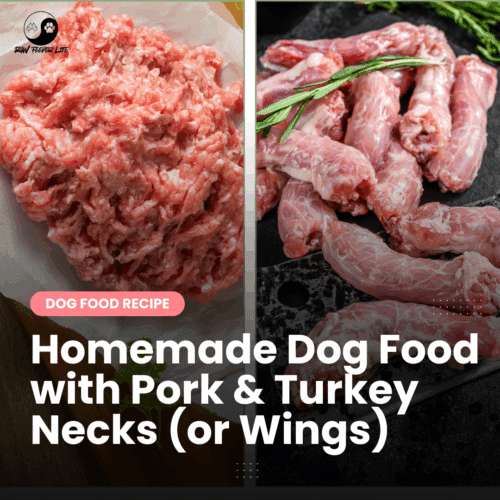Keep the Tail Wagging is supported by pet parents. I occasionally earn a commission (at no additional cost to you) when you click through an affiliate link to one of my favorite products. Thank you for your support. Read More
If someone were to give you 100 pasture-raised, certified organic, and humane eggs, would you take them? If you had asked me this question a year ago, I'd say no. I'd try to find a few friends who can help me out by taking some of the eggs, but I'd know that I'd have to leave some behind. Or would I? I recently learned that some people freeze eggs for their dogs.
Benefits of Feeding Raw Eggs to Dogs
Are you adding eggs to your dog's diet? If the answer is “no,” why the hell not? Eggs are one of the many superfoods that are available to us and our dogs. So let's chat about why eggs (raw or cooked) should be a regular part of our dogs' diet.
Eggs are the easiest part of raw feeding. Crack them open and add them to the dish – voila! Our dogs are eating eggs. They are filled with beneficial nutrients including protein, healthy fat, calcium band…
- Vitamin A supports eye health, the immune system, and organ functions.
- B Vitamins help break down food, absorb nutrients, and convert food to energy while supporting the nervous system and producing blood cells.
- Choline supports the metabolism, cognitive health, and cardiac health.
- Phosphorus works with the B Vitamins, helping the body to process food; phosphorus also repairs cells and tissues.
- Selenium has a lot of jobs in the body, including boosting cognitive health, the immune system, thyroid health, cardiac health, and it serves as a mega-antioxidant.
- Vitamin D supports bone health, helps the body absorb calcium and phosphorus, and supports the immune system.
- Vitamin E is another antioxidant, supports cell health, and cognitive health.
- Vitamin K helps the body's clotting capabilities; is important for injuries/wounds and dogs diagnosed with hemangiosarcoma.
- Zinc is beneficial for the immune system, decreases inflammation, and supports skin health and wound healing.
A lot of these nutrients do the same thing and work together to it well.
Should Eggs be Fed Cooked or Raw?
I prefer to feed raw eggs to dogs. It's fast, easy, and I'm a raw feeder.
But not everyone is down with raw eggs and I get it. A friend of mine has small dogs and a full raw egg is too much so she boils them and spread the egg over a week's worth of meals. It's tempting to think that cooking the egg destroys the nutrients, but this isn't the case. In fact, the nutrients don't change much.
How Often I Feed Eggs to My Dogs
I feed chicken eggs to my dogs three days a week; Monday, Wednesday, and Friday. I feed this way because it's easy for me to remember that “today is egg day,” when I have a schedule. Egg whites can create a biotin deficiency, which will lead to skin and coat issues. This is why I feed the whole egg (and not egg whites only) and why I don't feed eggs daily.
Where I Buy My Eggs
There are many sources for eggs. I purchase them from Costco and from friends who raise chickens.
Costco carries 18-count cartons of eggs for $5 to $6 that are pasture-raised and certified humane. For a dollar more, you can choose the eggs that are also certified organic. Buying eggs from friends is preferable because I see how the chickens are raised, what they're fed. That's to say that the brand sold in our Costco is being deceptive; I just like seeing the chickens myself. It's cool.
If you don't have a Costco near you and the eggs are too costly at the store; you can check Craiglist or the Facebook marketplace to find local people who sell chicken (duck, goose, or quail) eggs. Before buying, ask them how often they gather the eggs if their chickens lay them around the yard. I've ended up with a few rotten eggs in a dozen, which sucks.
Can We Freeze Eggs for Dogs?
So, to the topic of the blog post. Can we freeze eggs?
A fellow raw feeder scored a ton of free eggs. At first, I was bummed because she would have to turn them down or find a bunch of people to take eggs, but she kept them all and froze the eggs she didn't need immediately. I was stunned because I never considered freezing eggs, but it's a thing.
What are the Benefit of Freezing Eggs?
If you score a ton of free eggs, freezing the excess means that you can take them all. Freezing eggs is also a great idea if you're raising chickens and keep up with all of the eggs. As far as I know, there are no nutritional benefits to freezing eggs.
Does Freezing Impact the Nutrients?
Just like cooking, freezing does impact nutrients in our food. A few of the nutrients in frozen eggs can be seen below. The changes are most impactful, if my sources are correct, in Vitamin D and I'm certain it changes the longer the eggs are in the freezer.
| Raw Chicken Egg | Boiled Chicken Egg | Frozen Chicken Egg | |
| A | 5% | 5% | 3% |
| Calcium | 2% | 2% | 2% |
| D | 10% | 11% | 0% |
| B-12 | 6% | 10% | 5% |
| C | 0% | 0% | 0% |
| Iron | 4% | 3% | 3% |
| B-6 | 5% | 5% | 2% |
| Magnesium | 1% | 1% | 1% |
How Best Can We Store Eggs in the Freezer?
I couldn't find on the site where it shared why the shells couldn't be frozen. People who freeze eggs do so in three ways:
- Freeze a whole raw egg (with shells) – according to the USDA, we should freeze eggs outside of the shell (oops, I froze them in the shell). The site states that bacteria can enter the egg through cracks in the shell; as a raw feeder, this doesn't concern me. I didn't have any issues when I froze a few dozen eggs.
- Freeze eggs only (no shells) – this is recommended by the USDA and people who freeze eggs crack them into muffin pans.
- Freeze boiled eggs – boil the eggs, allow them to cool, remove the shell and freeze the egg. I haven't tried this; the USDA states that the quality isn't as good when freezing boiled eggs.
How Long Can Eggs Last in the Freezer?
According to the USDA eggs can be frozen for 12 months.











